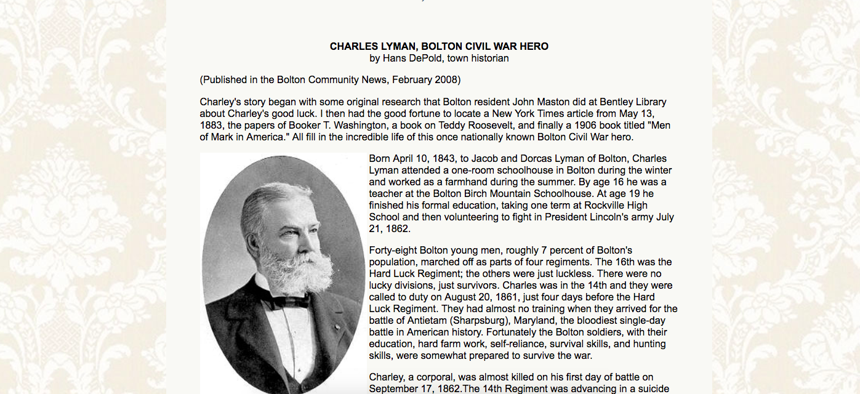The First Great Career Civil Servant
During Public Service Recognition Week, it’s worth taking note of Charles Lyman’s accomplishments.
In the annals of American government, Charles Lyman is little more than a footnote. But he holds the distinction of not only being a central figure in the creation of the modern civil service, but an exemplar of dedication to a career of high-ranking service in the federal government at a time when such a thing was exceedingly rare. During this Public Service Recognition Week, it’s worth taking note of his accomplishments.
Lyman was born in Bolton, Connecticut in 1843, according to a 2008 biography by the town historian. He fought in the Civil War at Antietam, Fredericksburg and Chancellorsville. Then “he began the active work of life in 1864, by entering the government service in Washington, District of Columbia, as a clerk in the Treasury Department,” reads an entry on Lyman in the 1906 collection, Men of Mark in America.
He rose through the ranks at Treasury, winning appointments as a civil service examiner and then chief examiner. In 1886, he was named to the Civil Service Commission. In 1889, Lyman was appointed president of the commission, and was joined on the panel by an energetic reformer named Theodore Roosevelt.
“While Mr. Roosevelt's work and attention were largely given to the investigation of abuses and violations of the law and rules, and to the education of public opinion in favor of the reform, through public addresses and the press,” Lyman’s Men of Mark in America entry reads, “Mr. Lyman's work was almost wholly administrative and constructive, his purpose and effort being to establish the reform on a sound and conservative basis and to develop it according to the more obvious and pressing needs of the public service.”
At a time when most federal jobs were reserved as plum rewards for a president’s political supporters, Lyman’s accomplishments stood out. He “provides an unusual example of a successful career civil servant who managed to survive the years of rampant spoils,” writes Richard D. White Jr. in his 2003 book on Roosevelt’s years as a civil service reform advocate.
Roosevelt’s first impression of Lyman was positive, although tempered by a view common to hard-charging political appointees with an agenda. “Lyman is a good, honest hard-working man, very familiar with the law,” Roosevelt wrote to a his friend Henry Cabot Lodge in September 1889. “But he is also the most intolerably slow of all the men who ever adored red tape.” A month later, Roosevelt characterized Lyman as “utterly useless.”
Roosevelt’s view of Lyman apparently softened over the years, because as president he named him to serve as chief of appointments at Treasury. And when it came to Roosevelt’s view of his own service on the Civil Service Commission, he seemed aware of his limitations.
“If I had been compelled to pass a civil service examination,” Roosevelt joked to a friend in 1889, “I never should have got my place.”
We’re honoring distinguished career federal employees like Lyman this year in the first annual Government Leadership Awards and Hall of Fame. Nominations are open until May 13.
NEXT STORY: GovExec at 50: The Dawn of Hollow Government




